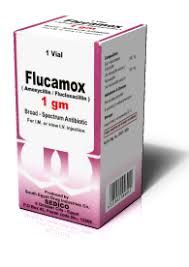Flucamox Injection is a parenteral antibiotic formulation that combines Flucloxacillin and Amoxicillin. It is used to treat a variety of bacterial infections, particularly those caused by penicillin-resistant staphylococci and other susceptible organisms. This injectable form is typically available in vials, allowing for intravenous (IV) or intramuscular (IM) administration.
Key Features
- Active Ingredients:
- Flucloxacillin: A penicillin antibiotic effective against gram-positive bacteria, especially staphylococci.
- Amoxicillin: A broad-spectrum penicillin antibiotic that targets a wide range of bacteria.
- Formulation: Available as a powder for solution, which must be reconstituted before use.
Indications
Flucamox Injection is indicated for:
- Severe Infections: Effective in treating skin and soft tissue infections, respiratory tract infections, urinary tract infections, and bone infections (osteomyelitis).
- Surgical Prophylaxis: Used to prevent infections during major surgical procedures.
- Endocarditis and Osteomyelitis: High doses may be required for these serious infections.
Dosage and Administration
- Recommended Dosage:
- Adults:
- IV: 250 mg to 1 g every six hours. For severe infections, doses may be increased to 2 g.
- IM: 250 mg four times a day.
- Children:
- Dosing is typically based on body weight, with recommendations of 25 to 50 mg/kg/day, divided into multiple doses.
- Administration Instructions:
- For IV administration, dissolve the powder in the appropriate volume of water for injection. Administer slowly over three to four minutes.
- For IM injection, reconstitute with sterile water as directed.
Side Effects
Common side effects may include:
- Gastrointestinal disturbances such as nausea or diarrhea.
- Allergic reactions like rash or itching.
- Rarely, more severe reactions can occur, including liver dysfunction and severe allergic reactions (anaphylaxis).
If any serious side effects occur, discontinue use immediately and seek medical attention.
Precautions
- Contraindications: Not suitable for individuals with known hypersensitivity to penicillins or cephalosporins. Caution is advised in patients with liver disease or jaundice.
- Pregnancy and Breastfeeding: Generally considered safe; however, consult a healthcare provider before use.
- Drug Interactions: Inform your doctor about any other medications you are taking to avoid potential interactions.

